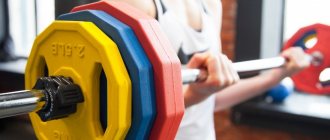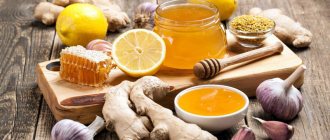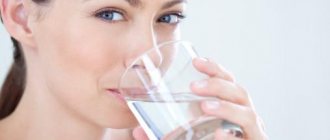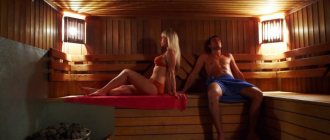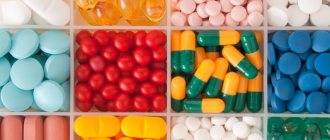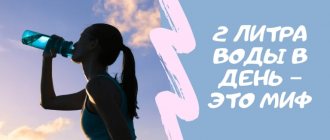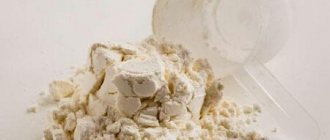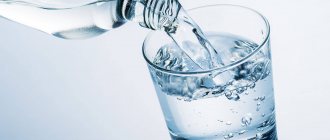Why drink during exercise?
Every athlete comes to the gym with a specific goal: to build muscles, lose weight, improve their figure, increase endurance, etc. Any intense workout leads to fluid loss. Ignoring this process can lead the body to disastrous consequences.
Anecdote: “It is known that a person is 80% water. Thus, it can be considered a vertical puddle.”
Laughter is laughter, but there is a considerable amount of truth in this joke. Indeed, every cell of our body: brain, muscles, bones, blood - consists of water. It takes part in the work of all vital systems - cleanses the intestines, removes waste and toxins, promotes cooling (during sweating), maintains a normal ratio of minerals.
Loss of fluid during exercise inevitably leads to electrolyte imbalance. What could be the consequences?
- Blood viscosity increases, so the load on the heart and blood vessels increases;
- Muscle tissue does not receive enough oxygen and nutritional components;
- Endurance deteriorates, concentration weakens;
- Absolutely all metabolic processes slow down, including the breakdown of fats. Therefore, training for weight loss becomes pointless;
- Amino acids and substances necessary for regeneration and growth reach the muscles more slowly, so they do not grow. The power complex is also in the firebox;
- An insufficient amount of fluid in the lubricating secretion of joints contributes to the development of various diseases and pain;
- Dehydration impairs strength and endurance, and can lead to overheating, fainting and even convulsions;
- The next day after a “dry” workout, your muscles will hurt 2 times more than usual. Therefore, even if you are not able to force yourself to drink an extra 100 ml of liquid during class, do not forget about water after finishing.
As you can see, it is necessary to drink while training in a rocking chair - this is the only way you will achieve results. However, it is also important to observe the measure, because excess fluid, as well as the wrong choice, can undo all the athlete’s efforts.
Useful qualities
Already from the name it is clear that water with sugar consists of two ingredients. And to find out how harmful or beneficial it is, you need to understand how granulated sugar affects our body. Let's start with its beneficial properties.
Polish doctors, as a result of long research, discovered that if sugar does not enter our body for a long time, the work of many systems will soon be disrupted. This sweet food in the brain (both brain and spinal cord) activates the blood circulation process. If you give up sugar altogether, this threatens with sclerotic transformations.
Sweet water and sugar have the following beneficial properties:
- They reduce the likelihood of plaques appearing in blood vessels and prevent the development of thrombosis.
- People with a sweet tooth are less likely to suffer from arthritis than those who don’t like “sweets.”
- Granulated sugar improves the functioning of the liver and spleen. Anyone diagnosed with these ailments is prescribed a diet high in glucose.
- If there are not enough saccharides in the body, its work is disrupted: the blood begins to circulate more slowly, and the activity of the central nervous system worsens. If you drink water with sugar, you will be guaranteed a surge of energy and strength.
- Sugar has a positive effect on the visual organs. Do you spend a lot of time at the computer? Eat more sweets and drink sugar water.
- Sweet water stimulates memory. In general, everyone who is engaged in mental work needs glucose.
- Even a tiny dose of sugar is enough to improve a person’s mood and eliminate insomnia. It’s not for nothing that when you’re stressed, it’s recommended to eat more sweets.
- If the body receives little glucose, malfunctions of the liver, kidneys and gall bladder may occur. Often, for ailments of these organs, this substance is administered intravenously. Sugar water prevents the appearance of such pathologies.
- A glass of sweet water will give everyone a great mood. After all, sugar promotes the release of serotonin, the hormone of joy, into the blood.
If you are depressed or have a nervous breakdown, eat brown sugar.
How much to drink during training?
Drinking too much is just as harmful as not drinking enough:
- Likewise, the water-salt balance is disturbed;
- Blood pressure may rise;
- If you have a history of kidney disease, there is a risk of edema;
- The gastrointestinal tract system is upset;
- The wrong liquids, drunk at the wrong time or in excess, can lead to a feeling of heaviness in the stomach, frequent urge to urinate, nausea and other individual consequences. Below we list what you should absolutely not drink while running or strength training.
The body itself will help you understand its own drinking rate during exercise. Listen to his requests. If you are very thirsty, drink. If you feel good, set aside for a quarter of an hour.
Normally, it is advisable to drink about 200 ml of fluid every 20 minutes of training. Thus, in an hour you should drink 0.6-1 liters, no more. However, if the room is stuffy, hot, and the workout is very intense or long, the volume of water may increase.
Main conclusions
During intense physical activity, the body rapidly loses moisture. For this reason, the issue of drinking during training becomes quite important. Rules for maintaining water balance during classes:
- drink at least 0.5-1 liters of fluid every hour of training (during intense exercise, the need for moisture is devoted);
- give preference to pure water without gas and sweeteners, diluted juices and green tea;
- Drink liquid in small portions every 10 minutes of training.
Lack of moisture during sports activities can lead to rapid dehydration, poor health and harm to health. Staying hydrated will help you achieve your fitness goals faster!
What to drink during training?
So, we come to the most interesting part: what to drink during a workout in the gym. By the way, the list of permitted drinks is quite large. We will look at them by category, and at the end of each section we will present the best options, thus compiling the TOP 10:
- Pure filtered water;
- Mineral still water;
- Store-bought isotonic;
- Beetroot-apple juice;
- Carrot juice;
- Juice from grapefruit, pineapples and apples;
- Ginger decoction;
- Infusion of thyme and rose hips;
- A decoction of ginseng, ginger and rose hips;
- Ready-made BCCA complexes.
Let's talk about each of the points in more detail.
Water
Of course, clean filtered water comes first. It will ideally maintain water and electrolyte balance and will not allow the body to suffer from dehydration. And if you also drink non-carbonated mineral water, with sodium, magnesium and potassium in the composition, you will also support it, which will certainly affect your endurance.
Drinking tap or boiled water during classes is not recommended. The first one is not pure enough, and the second one is “dead”.
Please note that with water everything is not as simple as it seems at first glance. And the debate on the topic: is it possible to drink water during training and, if so, in what quantity, still does not subside.
Isotonic
This is a sports drink whose composition is close to the natural composition of blood plasma. It includes minerals, sugar, vitamins, creatine, L-carnitine and sometimes flavoring.
Isotonic drinks significantly increase endurance, so it is recommended to drink them during long-term strength training. They are absorbed into the blood very slowly, so if you plan to exercise for a short time or the upcoming complex will not be very intense, it is better to prefer water this time.
If you are looking for what you can drink during a workout to lose weight, you don’t even have to consider isotonics. They are high in calories and do not promote weight loss.
Below is a list of the most popular isotonics:
- Powerade;
- Iso Max by Powerbar;
- Gotorade;
- ISO Drink Cool;
Natural freshly squeezed juices
During training, natural juices are an excellent way to cope with dehydration, and not only fruit juices - vegetable juices are also useful.
What is the best way to make juice? From apples, pears, carrots, beets, pumpkins, grapefruits, oranges, pineapples, tomatoes. You can also prepare any mixture of the listed products. The result is an excellent drink for maintaining mineral balance, rich in vitamins, micro and macroelements, and also low in calories.
To reduce the carbohydrate content, freshly squeezed juice is diluted with clean boiled water in a ratio of 1:1 or 1:2.
Herbal decoctions
The decoction is an ideal solution for athletes whose muscles take a long time to recover after training. Herbal drinks reduce pain, contain useful phytocomplexes and vitamins, strengthen the immune system, and tone well.
2 tablespoons of dry herb are poured into 1 liter of boiling water and left to cool. Then filter and pour into a sports thermos.
Such drinks should be drunk during training for fat burning; they perfectly activate metabolic processes.
Recommended herbs include rose hips, thyme, yarrow, eleutherococcus, ginger, St. John's wort, and ginseng.
May cause allergies, be careful.
BCSA
This complex of important amino acids should be drunk during strength training. Isoleucine, leucine and valine in its composition increase the athlete’s strength, endurance and, as a result, performance. They also add energy to the body, slow down the process of destruction of fibers in the muscles (so they hurt less), accelerate regeneration, and trigger muscle growth.
BCCA should be drunk during training for endurance, as well as for rapid muscle gain.
The drink does not replenish fluid balance, so it should be drunk in combination with water or juice.
Syrup
How to prepare sugar syrup? How much sugar per liter of water should you take? Let's look at these questions in more detail. It’s not difficult to prepare sweet water; even a child can do it. We take:
- 0.5 kg granulated sugar;
- 1 liter of water.
Sugar dissolves quickly in water. Prepare this drink as follows:
- Boil the water.
- Pour hot liquid over granulated sugar.
- Boil the mixture over low heat for 20 minutes.
- Strain the syrup through cheesecloth folded in three to four layers.
- Bring the volume of liquid to the original volume and boil again.
- Pour the syrup into a sterilized jar.
This drink can also be given to children, but in reasonable quantities.
What vitamins should you take?
When playing sports, it is important to consume enough vitamins and minerals. Many athletes take special supplements that make their daily diet more balanced.
What vitamins should you take during training for high-quality results?
- B vitamins - participate in protein-carbohydrate metabolism, prevent the development of varicose veins, accelerate metabolism, participate in fat metabolism, improve skin condition, nourish bone marrow, strengthen the nervous system;
- Folic acid – eliminates stress, accelerates muscle recovery;
- Vitamin C – strengthens the immune system, reduces pain and aches in joints and muscles, and promotes tissue growth;
- Vitamins K, E - strengthen blood vessels;
- Vitamins A, D, H - make the skin and muscles more elastic, strengthen the musculoskeletal system.
Please note that any vitamin complexes or specific medications can only be prescribed by a doctor.
What should you not drink during training?
If your goal is to restore water-salt balance, drinking the protein that many jocks love, as well as fat burners, creatines and other stimulants, is useless. No, they will not harm the body, but they will not bring any benefit either.
These drinks, except creatine, should not be drunk during training, but at least an hour before it. Otherwise, they will not have time to act, but will overload the heart and cause a surge in pressure. Creatine, on the contrary, is drunk an hour after exercise.
It is strictly prohibited to consume during sports training:
- Alcohol is not compatible with sports in any of its forms;
- Drinks containing caffeine are harmful cocktails for the cardiovascular system. Therefore, it is better to drink your deeply loved coffee before class;
- Energy drinks contain an insane amount of sugar, which does not quench your thirst at all. As a rule, the composition contains caffeine;
- Sweet soda - carbon dioxide irritates the gastric mucosa, causing gas formation and belching. Includes a lot of sugar, which provokes an insulin surge, and, as a result, a feeling of fatigue.
Each athlete independently chooses what to drink during training. Some people prefer clean water. Others are not lazy in preparing decoctions or squeezing juices. More advanced athletes buy isotonics and amino acid complexes. When choosing a drink, be sure to consider the purpose of the lesson, its duration, the conditions in the room, as well as your state of health!


